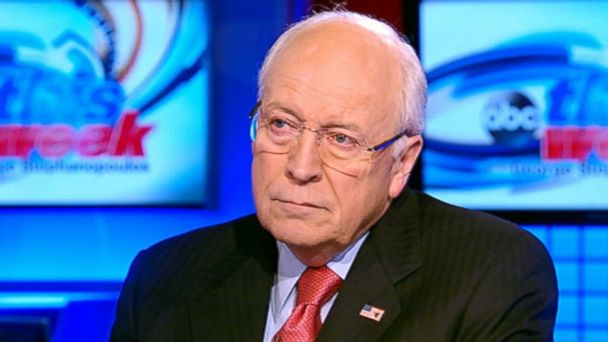Dick Cheney Skeptical U.S. Can Negotiate With Iran Over Nuclear Program
This morning on "This Week," former Vice President Dick Cheney said he did not have confidence in the Obama administration to negotiate a nuclear settlement with Iran and expressed skepticism about the ability of the U.S. achieving its objectives to stop the Iranian nuclear program without military action.
"I don't have a lot of confidence in the administration to be able to negotiate an agreement. I think sanctions offer some prospect of bringing the Iranians around. I've talked to my friends in that part of the region. I still know them, a lot of them, and they're very fearful that the whole Iranian exercise is going to go the same way as the Syrian exercise; that is, that there will be bold talk from the administration. But in the final analysis, nothing effective will be done about the Iranian program," Cheney said on "This Week" Sunday.
Cheney was asked by ABC's George Stephanopoulos if military action against Iran was inevitable.
"I have trouble seeing how we're going to achieve our objective short of that. And I doubt very much that the diplomacy will be effective if there's not the prospect that, if diplomacy fails, that we will, in fact, resort to military force," he said.
Cheney, whose advice to strike the Syrian nuclear program in 2007 was rejected by other Bush administration officials, said such action would have served as a deterrent to Iran, and would have put the U.S. in a better negotiating position with Iran today. Israel eventually took out the Syrian nuclear facility in an airstrike in Sept. 2007.
"I thought it would be important if we took out the Syrian reactor, that it would send a very important signal to the Iranian program, that we'd drawn a red line," Cheney said on "This Week" Sunday. "And if we had taken out the Syrian reactor the way the Israelis did, and they wanted us to do it, we would have sent a clear signal about proliferation. We would have given substance and meaning to our diplomacy."
"The Iranians would have to look at that and say, 'These guys are serious about it. They mean business,'" Cheney added. "And we'd be much more effective today negotiating with the Iranians if we'd taken out that Syrian reactor seven years ago."

ABC News
Cheney also lamented what he described as waning influence of the U.S. in the Middle East, saying our allies in the region "no longer count on us."
"I think the U.S. presence in the Middle East was enormously important now for decades, going all the way back certainly before Desert Storm. I think that presence and that capability and that influence has been significantly diminished as we have withdrawn from the region. We've cut the number of forces we have in the region," Cheney said.
"I think our friends no longer count on us, no longer trust us and our adversaries don't fear us. That was sort of the cornerstone and the basis of the U.S. ability and influence," he added.
"If we're not heavily involved there, if we've turned our back on the region, if we've had a president who believes we overreacted to the terrorism attacks on 9/11, I think the Saudis, the Emirates, the Egyptians, many in that part of the world no longer have confidence in the United States," Cheney said.
Like "This Week" on Facebook here . You can also follow the show on Twitter here .
Go here to find out when "This Week" airs in your area.